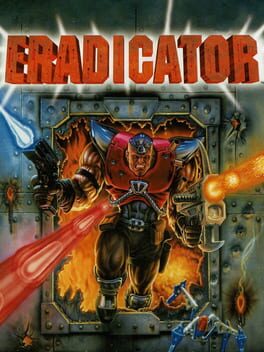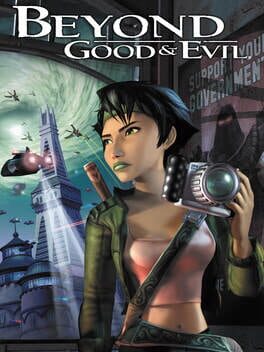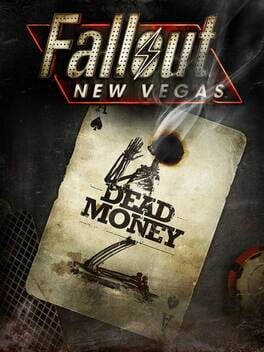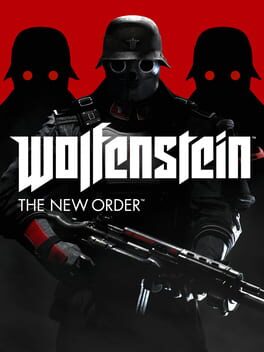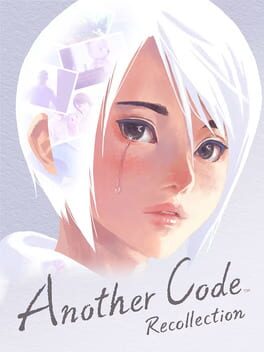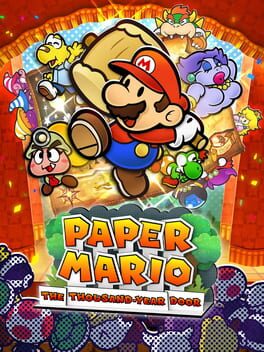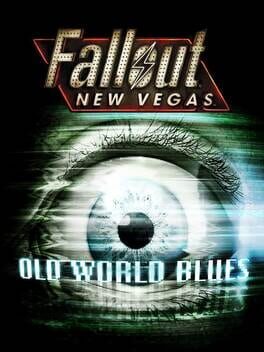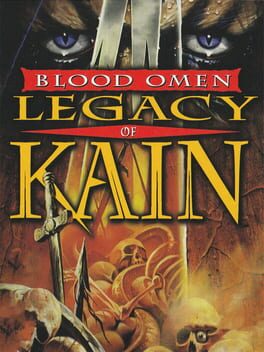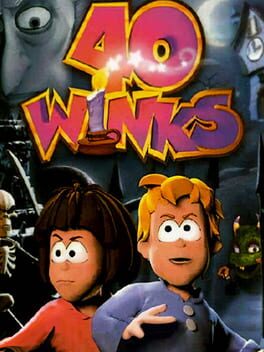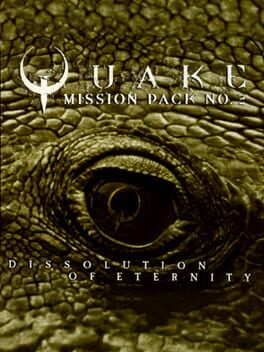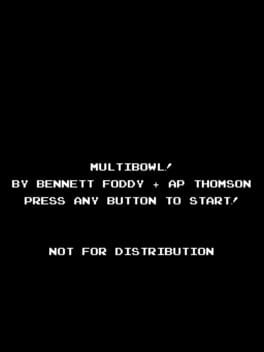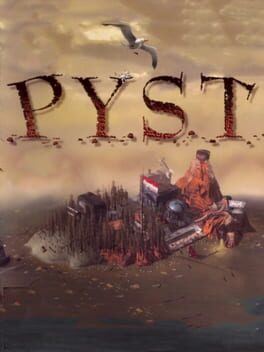ZapRowsdower
728 Reviews liked by ZapRowsdower
Eradicator
1996
Eradicator is such an underrated 90s FPS!
It got overshadowed by Duke Nukem and Shadow Warrior's success. This one is equally good!
Eradicator lets you play in first-person or third-person, it's your choice! We have 3 characters to play as (a 4th one is unlocked after the game's completion). There are also some enemies/explosives that can be controlled remotely, which I found pretty fun.
The only two problems with this game are one - it crashes after the final cinematic, - and two - in some levels, you might get stuck in walls, so I'd suggest the usage of the No Clip cheat or reloading the last save.
It got overshadowed by Duke Nukem and Shadow Warrior's success. This one is equally good!
Eradicator lets you play in first-person or third-person, it's your choice! We have 3 characters to play as (a 4th one is unlocked after the game's completion). There are also some enemies/explosives that can be controlled remotely, which I found pretty fun.
The only two problems with this game are one - it crashes after the final cinematic, - and two - in some levels, you might get stuck in walls, so I'd suggest the usage of the No Clip cheat or reloading the last save.
Beyond Good & Evil
2003
Absolutely love this game, but it's definitely aged a lot over the years. The art direction and music is incredible. It has a lot of little touches that I love... and the game's method of typing in passwords is brilliant. It's way better than just about any other controller based keyboard out there.
The game's got some issues, though. Mainly that the Zelda-like dungeons start incorporating a lot of half-baked stealth sections and that the game has an abrupt ending. There's a lot of promise in the game's story, but it doesn't do a ton with it.
The game's got some issues, though. Mainly that the Zelda-like dungeons start incorporating a lot of half-baked stealth sections and that the game has an abrupt ending. There's a lot of promise in the game's story, but it doesn't do a ton with it.
Beyond Good & Evil
2003
I've always heard of Beyond Good & Evil as something of a cult classic; critically acclaimed, but not the system seller or series seller that Ubisoft's later works Prince of Persia: Sands of Time or Tom Clancy's Splinter Cell: Chaos Theory would become, and as a result Beyond Good & Evil got swept to the side, never to really be heard from again while Assassin's Creed got a million sequels. And it's such a damn shame that happened, because Beyond Good & Evil is so fucking good.
I don't think it's the most polished game out there; there are occasional moments of jank where your AI companion might take a little bit longer to get to your position (and for me, got stuck in the doorway once) and how corner hit detection during races and the goddamn pellet game messed me up multiple times. And the combat is servicable, not amazing; you can get by just hack and slashing most of the time, and this could have used a bit more depth. And yet I will choose to overlook these minor moments, because this is one of the coolest games I've played, and also one of the most thoughtful games I've played. It's just long enough to hide many snug little secrets around the world and make you put in the effort, but short enough to where it doesn't outstay its welcome. The plot is somehow interesting without becoming super convoluted, and it's just dark enough to take itself seriously and stay earnest without sounding overly gloomy or edgy. There aren't a ton of main characters, but the main cast has a lot of personality spread out through the game's relatively short run length. And the puzzles are simple enough to where you can easily figure them out on your own, but still manage to give you a real sense of satisfaction and excitement over how you just managed to piece that on your own. And all the collectibles are spaced apart well enough to where you're naturally encouraged to explore the whole world, with the tools necessary if you need that extra helping hand. Speaking of which, this is probably the first game where I genuinely enjoyed the stealth segments, which I honestly cannot say of any other game I've played up to this point. It's just clean, stylized, stealth that isn't punishing if you mess up yet gives off the feeling that you're being a sneaky secret agent fighting against dirty corporate overlords and seeking justice for those who have been wronged.
In conclusion, while I don't think Beyond Good & Evil looks like or plays like an exceptional game necessarily (it is a product of its age, after all), it's such a damn well thought out cohesive experience and was the Goldilocks of the action-adventure genre that I never knew I needed. Who would have guessed that combining photography with the Legend of Zelda model and throwing in effective stealth sequences would have done it for me? I lament that the game has been mostly forgotten by Ubisoft due to how difficult it was to finagle a working copy (ex: the PC copy has screwy camera scroll speed, the GameCube copy is letterboxed, and the HD Remaster on PS3 can't be bought on the store anymore to be played on PS4/PS5), because it is such a fun and satisfying title to go through. I'm glad though, that audiences are finally giving it the credit it deserves, and I'll happily join the crowd of dozens that are praying for Beyond Good and Evil 2 outside of development hell.
I don't think it's the most polished game out there; there are occasional moments of jank where your AI companion might take a little bit longer to get to your position (and for me, got stuck in the doorway once) and how corner hit detection during races and the goddamn pellet game messed me up multiple times. And the combat is servicable, not amazing; you can get by just hack and slashing most of the time, and this could have used a bit more depth. And yet I will choose to overlook these minor moments, because this is one of the coolest games I've played, and also one of the most thoughtful games I've played. It's just long enough to hide many snug little secrets around the world and make you put in the effort, but short enough to where it doesn't outstay its welcome. The plot is somehow interesting without becoming super convoluted, and it's just dark enough to take itself seriously and stay earnest without sounding overly gloomy or edgy. There aren't a ton of main characters, but the main cast has a lot of personality spread out through the game's relatively short run length. And the puzzles are simple enough to where you can easily figure them out on your own, but still manage to give you a real sense of satisfaction and excitement over how you just managed to piece that on your own. And all the collectibles are spaced apart well enough to where you're naturally encouraged to explore the whole world, with the tools necessary if you need that extra helping hand. Speaking of which, this is probably the first game where I genuinely enjoyed the stealth segments, which I honestly cannot say of any other game I've played up to this point. It's just clean, stylized, stealth that isn't punishing if you mess up yet gives off the feeling that you're being a sneaky secret agent fighting against dirty corporate overlords and seeking justice for those who have been wronged.
In conclusion, while I don't think Beyond Good & Evil looks like or plays like an exceptional game necessarily (it is a product of its age, after all), it's such a damn well thought out cohesive experience and was the Goldilocks of the action-adventure genre that I never knew I needed. Who would have guessed that combining photography with the Legend of Zelda model and throwing in effective stealth sequences would have done it for me? I lament that the game has been mostly forgotten by Ubisoft due to how difficult it was to finagle a working copy (ex: the PC copy has screwy camera scroll speed, the GameCube copy is letterboxed, and the HD Remaster on PS3 can't be bought on the store anymore to be played on PS4/PS5), because it is such a fun and satisfying title to go through. I'm glad though, that audiences are finally giving it the credit it deserves, and I'll happily join the crowd of dozens that are praying for Beyond Good and Evil 2 outside of development hell.
“Indiana… Let it go”
My first playthrough of Dead Money was a purposeful, intense experience, and one that I won’t ever forget. The atmosphere in this DLC is off the charts. On that first run, I understood the point of the story, and followed it to its natural conclusion: letting go.
But this wasn’t my first playthrough.
CHA-CHING! See ya Dean Dumbino, I’m walking outta here with 37 gold bars ya coward! Why would I stay here if I’m banned from gambling, anyway? Yo Eli, I’m not specced for laser guns, so I threw your LAER straight in the trash! I’m gonna get so many implants I might have to join an MLM! See ya never, GodDog! Whatever your deal was. Christine, love the hair. I’d say hi to Veronica for you but she won’t talk to me on account of burying all of her old racist friends in that bunker. Yeah baby! Dead MONEY $$$$ ar ar ar ar SpongeBob me boy
My first playthrough of Dead Money was a purposeful, intense experience, and one that I won’t ever forget. The atmosphere in this DLC is off the charts. On that first run, I understood the point of the story, and followed it to its natural conclusion: letting go.
But this wasn’t my first playthrough.
CHA-CHING! See ya Dean Dumbino, I’m walking outta here with 37 gold bars ya coward! Why would I stay here if I’m banned from gambling, anyway? Yo Eli, I’m not specced for laser guns, so I threw your LAER straight in the trash! I’m gonna get so many implants I might have to join an MLM! See ya never, GodDog! Whatever your deal was. Christine, love the hair. I’d say hi to Veronica for you but she won’t talk to me on account of burying all of her old racist friends in that bunker. Yeah baby! Dead MONEY $$$$ ar ar ar ar SpongeBob me boy
BioShock Infinite
2013
what if… racism was bad? but what if… hating racism too much… was also bad? wish roger ebert was here to see this… he’d understand just how Important this game is
…I guess, on that point, it’s always interesting to me what games get put on a pedestal — what, according to Gamers, ‘proves’ that games can be art. Every few years it always seems like something comes out that’s immediately lauded for pushing the medium forward, for being more than just something where you press the buttons to run and jump, for really showing just what gaming can be… and they’re usually all triple-A western franchise titles, exorbitantly priced, and being touted as such by more mainstream publications — the ones that don’t generally cover games that don’t have a marketing budget or pre-existing hype behind them. No judgment towards any of those games, of course, I’ve yet to play any of them, but it seems as if the argument is more as to whether mainstream games can be art — whether or not we can make Roger Ebert a Gamer. There’s so many cool games out there that, to some extent have already proved what this medium is capable of, but to some extent, it's always been a measure of self-validation more than it’s ever been a desire to broaden one’s horizons. It’s kind of like those weird Gaylor Swift conspiracy theorists: why listen to an actual LGBT artist when I can instead pretend my favourite white woman actually stands for something? Why leave my comfort zone when I already have the validation I want?
What personally bugs me is that a lot of what gets pushed forward as 'prestige,' I feel, doesn’t truly take advantage of what the medium truly offers, or, as is often the case, are actively scared of letting you actually play the game. There are so many cool things you can do, so many ways you could use game mechanics or ludonarrative to illustrate or underline a thematic point, but so many of these Elevated games instead feel like they’re going for things that movies can already do, and I feel like that’s leaning in the wrong direction as to what can, honestly, feel profound. Just as an off-the-cuff example, the final choice of Ace Attorney: Justice For All asks whether you, as the defense, plead your client as guilty or innocent. Do you believe in protecting your client, or protecting the innocent? Do you exact (relative) mercy on somebody who’s wronged you? Or do you subject them to the monkey’s paw-esque fate they've more than had coming? Which of those is truly just? It’s not a choice that matters — the scene plays out the same regardless of what you pick — but in this sense the option you choose exposes something of you, the player: what you value, and what you, personally, have taken out of everything that’s just happened. You have to choose — the scene doesn’t move forward until you do — and in that sense, it's something that could only be done within an interactive medium: you are directly made to engage with the text, you are directly made to provide your own interpretation of its thematic content. BioShock Infinite does something similar within its first hour, and the question asked is just as profound: are you racist? Or are you not racist?
…I don’t think it’s really going to be possible to talk about BioShock Infinite without talking about… all that, huh?
sigh
I have to begin this with a disclaimer, I guess: I’m white, I don’t think I’m entirely equipped to be talking about this, but the guy who wrote this is also white so maybe, actually, I’m just as qualified to at least try. This game thinks it's making this grand, profound statement about how racism is bad — and how the ‘good old days’ of the U.S, as is the visual aesthetic of Columbia, was built on the abuse and discrimination of the non-whites and immigrants — yet fails to back that up at every turn. For as loudly as it says it, it doesn’t feel like it has much to actually say, with most of its observations feeling so so, surface level. What does the game define ‘racism’ as, anyway? Is it the mere act of an individual discriminating against another on the basis of their race, or is it the systemic act of providing opportunities and benefits to one group over others? Is this society meant to be based off of the pre-emancipation era of the United States, the ‘separate but equal’ segregation that preceded the civil rights movement, or one of the periods in-between? Is there anything that can be said about how white supremacy movements are still prevalent today? Is there anything worth mentioning in how almost all the enemies during the first half of the game are cops? I wouldn’t know: the game doesn’t seem particularly interested in actually going in-depth on the topic, feeling like it’s merely taking a brave stance of ‘racism was bad’ and expecting that to be enough.
And it’s frustrating because it often feels like the game is on the cusp of saying something actually potent… right before it veers away without fully committing to it. You start the game in a church, it becomes clear that Columbia is very much a fundamentalist state. You could maybe lean into how most fundamentalists will misquote or selectively take from the Bible to justify their bigotry, or maybe even go into how the church was often used to subjugate and control colonized peoples… or you could simply treat this the same way the racism is treated in general: very surface level, religious fundamentalism is bad because religious fundamentalism is bad and because using religious words like 'our prophet' and 'messiah' to surround your bad guy is subversive and creepy. Early on, after rescuing Elizabeth, you’re sent to a beach area, you get to mingle, and you learn that the segregation discriminates against the Irish, as well. You could use this to maybe go into the historical mistreatment of Ireland, maybe show how these fascist systems will keep moving the goalposts until those at the very top of their hierarchy remain… or you could just, like, never really bring it up again. That works too. Later on, you go into a museum, you find out that the justification for this discrimination is that the founder/prophet of Columbia lost his wife because the labor underclass rose up and killed her and this could be so fascinating and a window of the paradox in how fascist systems treat women: both as one of the defacto ‘inferiors’ to be subjugated… yet at the same time the madonna figure, whose innocence must be protected, and who through this comes the justification to commit atrocities against the other inferiors. The game is on the cusp of realizing this with Elizabeth — being locked up in a gilded cage, being forbidden from interacting with the outside world, yet also being a literal symbol, both the justification and continuation of this totalitarian system — and then this is all just thrown to the wayside because the story wants her to be Cute and Quirky. Every time this story stumbles on something it could actually say it decides it doesn’t feel like doing so. It wants credit for taking the stance it does but never actually wants to get its feet in the muck. And here I thought art was meant to alienate. Silly me.
(also… I feel like if you’re at least trying to condemn racism I don’t think it’s a great idea to have the only defined asian characters be speaking in broken English? again, white guy over here, I don’t want to make assumptions on things I don’t know well about, but, like, maybe not the time and place?)
I mean, I guess it’s trying to be anti-racist. I think that’s what it’s trying to be. I mean I’m not as confident as I was initially because holy shit does the game fucking swerve on its message right at the halfway point. See, by opposing the forces of Columbia, you eventually come into contact with a cabal of rebels seeking to overthrow this fascist system. You help them out (but… only because you’re forced to, Booker is rather ‘yeah whatever’ about basically everything other than Elizabeth), and by changing the timeline to give them GUNS you give them the means to meaningfully act out and rise up against their oppressors… to which the game immediately goes “oh no… this protest… is too violent… are these people really all that different from the slave owners?” And then suddenly the rebel leader goes “oh, by the way, something something you’re not the real you, you must die,” the game decides to show she’s actually The Bad Guy by having her try and murder a child, Elizabeth is made to kill her, and Booker’s response, verbatim, is “the only difference between [a racist, totalitarian system] and [trying to overthrow said racist, totalitarian system] is how you spell the name.” Maybe the Vox Populi should’ve just protested peacefully, ala MLK and Ghandi. Maybe we should’ve just voted out Hitler. And- and honestly what’s most wild for me is that this is how the game just fucking forgets that it’s about fascism and racism right after this. You watch Elizabeth shootthe only named black character in the game the rebel leader and the fallout of the scene is pressing F to reassure her that everything’s okay. The rest of the plot that follows is almost exclusively about time travel and alternate dimensions as opposed to anything regarding the rather delicate subject matter the game was attempting to handle earlier. The slavery of this one white woman is more important than the slavery of Columbia’s entire underclass. You shoot down rebel soldiers almost exclusively past this point and neither you nor the narrative bats an eye.
(addendum here: a friend pointed me towards BioShock Infinite’s Wikipedia page and I really just have to share this paragraph here because, like, what the fuck do you mean “the good and bad sides of racism”? what the fuck do you mean you weren’t trying to make a point and were merely trying to be 'accurate for the time'? I’m going to selectively apply death of the author here so that I don’t have to edit everything I just said because, like, jesus dude, I don't think a game has ever made me lose respect for its writer like this)
One last thing before I move on past the story: I’m notttttttt an Elizabeth fan, sorry. She never quite felt real or consistent as a character; more like a manic pixie dream girl, malleable to be whatever is required to facilitate the plot. The moment you meet her is the moment you free her from the gilded cage she’s been trapped in her whole life, and it was the same moment my suspension of belief broke. It feels like Elizabeth has barely any reaction to any of this, no horror at realizing just how large the world around her actually is, no transitional period to actually being outside for the first time in her life, she’s just immediately exuberant, so wide-eyed at everything, unable to stop herself from dancingwith racists as soon as she hears fiddle music. And it comes off like like it’s trying to make her so Cute and Quirky and Lovable and to me it never really worked. Especially when the game pulls absolutely all the narrative beats you’d expect it to. The Liar Revealed bit leading into the Second Act Breakup — where once you get back together and she still doesn’t trust you the game can’t even fucking commit and have her not help you as much during combat because then maybe that’d at least be a fun way this attempt at art could actually remember what medium it’s in. You’ll have an argument that’ll open a (metaphorical) rift between the two of you and then you’ll point at a locked door and she’ll be like “I’ll get that open for you Mr. Booker : ) “ So much of her dialogue — especially once the game decides it wants to be about alternate dimensions and time travel — is so flowery and… honestly, I’d say a bit pretentious in execution, feeling like it’s actively trying to position itself (and a lot of the plot elements here) as complex and smart, thinking that by making it just barely intelligible whoever’s playing it will be like “wow… this is so complicated… and beyond me… this game is so intelligent…” By the way I just love how the game says, verbatim, “[y]ou don’t need to protect Elizabeth in combat[,] she can take care of herself” like it’s some girl power, progressive thing… then all she actually does in combat is throw you items, open doors you can't, let you tear rifts in time to give you things that’ll help you, teleport right near you when you’re not looking like that one Sherlock Holmes game. She’s basically all the things an escort NPC does except I guess making you actually have to escort her would be a point of division among the Gamers. And it very much falls into that trope where a female character primarily exists to bolster their male counterpart, except here they try and dress it up as if it's subversive and feminist. Between that and some of the quips, you could’ve made me think Joss Whedon wrote this.
So, uh, yeah. I’m not particularly into what this game has going narrative-wise. It wants to act as if it’s tackling these huge themes, it thinks it’s profound by doing so, yet at every turn it feels so unwilling to divide, or challenge, or properly stand for something that it veers away from anything interesting it could actually say — let alone how little it does anything with the medium it’s actually in. And- and Jesus I’m still so thrown by how it can’t commit to even going just ‘racism’ is bad, it has to both sides it, it has to please everybody, it’s so scared of alienating that it alienates itself. If this is art, then maybe that speaks to having to go back to art class.
...At least the gameplay’s loosely fun?
Which reveals my position in the debate, I guess. For all I’ve talked about what makes art — and why I feel like sometimes what gets touted as prestige doesn’t quite meet the metric — I don’t really have much of a horse in this race. I’ll be happy to do my best to discuss themes, and I’ll always look at these things as more than just product, but as a writer, as someone who looks at things from that lens, I’ve always personally been more interested in looking at things from a technical lens: the craft, how it’s refined, what works, what could use improvement. And from that lens, BioShock Infinite is… cromulent. I like shooting things. I like the way the game only giving you two guns basically encourages you to vary with what you carry with you — building an impromptu armory from whatever you can scrounge up around you. I’m fond of the ‘vigors’/phasmids/magic spells you can use, how they all help out in different ways. I especially like how this combines with the gear system in a way that lets the player create legit builds: on my end, I eventually ended up with this playstyle where I’d use a vigor to fling myself directly towards an enemy, whereupon I’d create a giant AOE explosion and wipe out whatever cluster of enemies surrounds my target. I also like the way the game… both hews close and veers away from BioShock the series. It has all the hallmarks, all the defining characteristics that made the series what it was, yet it alters or recontextualizes them in a way that makes them feel fresh. Chief among these is the setting — which, while visually rather breathtaking on its own, really works as a companion piece to Rapture, a city in the sky rather than a city in the sea — but there are other things too: the anachronistic covers of 60s-80s songs mirror BioShock 1/2‘s usage of period-accurate music while also working to set up the timey-wimey aspects of the plot. The combat feels exactly like the previous two games, yet the use of more open areas, in addition to mechanics like the skywires and the rifts make it feel much more fluid, much more arcadey than the claustrophobic meat grinder of Rapture. I’m not entirely sure whether it’s a step forward or a step back, necessarily, but it’s certainly an iteration: things have been looked at, tweaked to become brand new… while not losing the same feel they used to have. It’s neat to see in action.
But man, while I’m not somebody who usually likes judging a work for being an adaptation, a sequel, whatever, it is just… rather tragic that a lot of the wrong lessons seem to have been learned from it. The original BioShock, to me, is genuinely so cool in showing just what videogames: silly moral choice system aside, there’s so much going on with ludonarrative, and diegesis, and it feels like every little videogame-logic thing has something going on behind it in a way that contributes to the overall picture. To go from that, to something that has virtually nothing going on mechanically is such a disappointment. And, in turn, when what’s there instead is something that feels like it’s convinced itself of its ascension, that takes real-world sensitive subject matter for the sake of set design and abandons it once it's no longer needed, that mistakes being complicated for being smart, man am I not impressed. It’s funny, honestly, how this loosely ushered the whole era we’re in of prestige, ‘artsy’ games that at the same time seem so afraid of being video games, because it’s BioShock Infinite’s gameplay that makes me hesitate to call it outright bad. It thinks it’s some profound work, some real watershed moment, something that’s really pushing the medium of gaming forward. In reality, it feels much more like Oscar bait. 4/10.
…I guess, on that point, it’s always interesting to me what games get put on a pedestal — what, according to Gamers, ‘proves’ that games can be art. Every few years it always seems like something comes out that’s immediately lauded for pushing the medium forward, for being more than just something where you press the buttons to run and jump, for really showing just what gaming can be… and they’re usually all triple-A western franchise titles, exorbitantly priced, and being touted as such by more mainstream publications — the ones that don’t generally cover games that don’t have a marketing budget or pre-existing hype behind them. No judgment towards any of those games, of course, I’ve yet to play any of them, but it seems as if the argument is more as to whether mainstream games can be art — whether or not we can make Roger Ebert a Gamer. There’s so many cool games out there that, to some extent have already proved what this medium is capable of, but to some extent, it's always been a measure of self-validation more than it’s ever been a desire to broaden one’s horizons. It’s kind of like those weird Gaylor Swift conspiracy theorists: why listen to an actual LGBT artist when I can instead pretend my favourite white woman actually stands for something? Why leave my comfort zone when I already have the validation I want?
What personally bugs me is that a lot of what gets pushed forward as 'prestige,' I feel, doesn’t truly take advantage of what the medium truly offers, or, as is often the case, are actively scared of letting you actually play the game. There are so many cool things you can do, so many ways you could use game mechanics or ludonarrative to illustrate or underline a thematic point, but so many of these Elevated games instead feel like they’re going for things that movies can already do, and I feel like that’s leaning in the wrong direction as to what can, honestly, feel profound. Just as an off-the-cuff example, the final choice of Ace Attorney: Justice For All asks whether you, as the defense, plead your client as guilty or innocent. Do you believe in protecting your client, or protecting the innocent? Do you exact (relative) mercy on somebody who’s wronged you? Or do you subject them to the monkey’s paw-esque fate they've more than had coming? Which of those is truly just? It’s not a choice that matters — the scene plays out the same regardless of what you pick — but in this sense the option you choose exposes something of you, the player: what you value, and what you, personally, have taken out of everything that’s just happened. You have to choose — the scene doesn’t move forward until you do — and in that sense, it's something that could only be done within an interactive medium: you are directly made to engage with the text, you are directly made to provide your own interpretation of its thematic content. BioShock Infinite does something similar within its first hour, and the question asked is just as profound: are you racist? Or are you not racist?
…I don’t think it’s really going to be possible to talk about BioShock Infinite without talking about… all that, huh?
sigh
I have to begin this with a disclaimer, I guess: I’m white, I don’t think I’m entirely equipped to be talking about this, but the guy who wrote this is also white so maybe, actually, I’m just as qualified to at least try. This game thinks it's making this grand, profound statement about how racism is bad — and how the ‘good old days’ of the U.S, as is the visual aesthetic of Columbia, was built on the abuse and discrimination of the non-whites and immigrants — yet fails to back that up at every turn. For as loudly as it says it, it doesn’t feel like it has much to actually say, with most of its observations feeling so so, surface level. What does the game define ‘racism’ as, anyway? Is it the mere act of an individual discriminating against another on the basis of their race, or is it the systemic act of providing opportunities and benefits to one group over others? Is this society meant to be based off of the pre-emancipation era of the United States, the ‘separate but equal’ segregation that preceded the civil rights movement, or one of the periods in-between? Is there anything that can be said about how white supremacy movements are still prevalent today? Is there anything worth mentioning in how almost all the enemies during the first half of the game are cops? I wouldn’t know: the game doesn’t seem particularly interested in actually going in-depth on the topic, feeling like it’s merely taking a brave stance of ‘racism was bad’ and expecting that to be enough.
And it’s frustrating because it often feels like the game is on the cusp of saying something actually potent… right before it veers away without fully committing to it. You start the game in a church, it becomes clear that Columbia is very much a fundamentalist state. You could maybe lean into how most fundamentalists will misquote or selectively take from the Bible to justify their bigotry, or maybe even go into how the church was often used to subjugate and control colonized peoples… or you could simply treat this the same way the racism is treated in general: very surface level, religious fundamentalism is bad because religious fundamentalism is bad and because using religious words like 'our prophet' and 'messiah' to surround your bad guy is subversive and creepy. Early on, after rescuing Elizabeth, you’re sent to a beach area, you get to mingle, and you learn that the segregation discriminates against the Irish, as well. You could use this to maybe go into the historical mistreatment of Ireland, maybe show how these fascist systems will keep moving the goalposts until those at the very top of their hierarchy remain… or you could just, like, never really bring it up again. That works too. Later on, you go into a museum, you find out that the justification for this discrimination is that the founder/prophet of Columbia lost his wife because the labor underclass rose up and killed her and this could be so fascinating and a window of the paradox in how fascist systems treat women: both as one of the defacto ‘inferiors’ to be subjugated… yet at the same time the madonna figure, whose innocence must be protected, and who through this comes the justification to commit atrocities against the other inferiors. The game is on the cusp of realizing this with Elizabeth — being locked up in a gilded cage, being forbidden from interacting with the outside world, yet also being a literal symbol, both the justification and continuation of this totalitarian system — and then this is all just thrown to the wayside because the story wants her to be Cute and Quirky. Every time this story stumbles on something it could actually say it decides it doesn’t feel like doing so. It wants credit for taking the stance it does but never actually wants to get its feet in the muck. And here I thought art was meant to alienate. Silly me.
(also… I feel like if you’re at least trying to condemn racism I don’t think it’s a great idea to have the only defined asian characters be speaking in broken English? again, white guy over here, I don’t want to make assumptions on things I don’t know well about, but, like, maybe not the time and place?)
I mean, I guess it’s trying to be anti-racist. I think that’s what it’s trying to be. I mean I’m not as confident as I was initially because holy shit does the game fucking swerve on its message right at the halfway point. See, by opposing the forces of Columbia, you eventually come into contact with a cabal of rebels seeking to overthrow this fascist system. You help them out (but… only because you’re forced to, Booker is rather ‘yeah whatever’ about basically everything other than Elizabeth), and by changing the timeline to give them GUNS you give them the means to meaningfully act out and rise up against their oppressors… to which the game immediately goes “oh no… this protest… is too violent… are these people really all that different from the slave owners?” And then suddenly the rebel leader goes “oh, by the way, something something you’re not the real you, you must die,” the game decides to show she’s actually The Bad Guy by having her try and murder a child, Elizabeth is made to kill her, and Booker’s response, verbatim, is “the only difference between [a racist, totalitarian system] and [trying to overthrow said racist, totalitarian system] is how you spell the name.” Maybe the Vox Populi should’ve just protested peacefully, ala MLK and Ghandi. Maybe we should’ve just voted out Hitler. And- and honestly what’s most wild for me is that this is how the game just fucking forgets that it’s about fascism and racism right after this. You watch Elizabeth shoot
(addendum here: a friend pointed me towards BioShock Infinite’s Wikipedia page and I really just have to share this paragraph here because, like, what the fuck do you mean “the good and bad sides of racism”? what the fuck do you mean you weren’t trying to make a point and were merely trying to be 'accurate for the time'? I’m going to selectively apply death of the author here so that I don’t have to edit everything I just said because, like, jesus dude, I don't think a game has ever made me lose respect for its writer like this)
One last thing before I move on past the story: I’m notttttttt an Elizabeth fan, sorry. She never quite felt real or consistent as a character; more like a manic pixie dream girl, malleable to be whatever is required to facilitate the plot. The moment you meet her is the moment you free her from the gilded cage she’s been trapped in her whole life, and it was the same moment my suspension of belief broke. It feels like Elizabeth has barely any reaction to any of this, no horror at realizing just how large the world around her actually is, no transitional period to actually being outside for the first time in her life, she’s just immediately exuberant, so wide-eyed at everything, unable to stop herself from dancing
So, uh, yeah. I’m not particularly into what this game has going narrative-wise. It wants to act as if it’s tackling these huge themes, it thinks it’s profound by doing so, yet at every turn it feels so unwilling to divide, or challenge, or properly stand for something that it veers away from anything interesting it could actually say — let alone how little it does anything with the medium it’s actually in. And- and Jesus I’m still so thrown by how it can’t commit to even going just ‘racism’ is bad, it has to both sides it, it has to please everybody, it’s so scared of alienating that it alienates itself. If this is art, then maybe that speaks to having to go back to art class.
...At least the gameplay’s loosely fun?
Which reveals my position in the debate, I guess. For all I’ve talked about what makes art — and why I feel like sometimes what gets touted as prestige doesn’t quite meet the metric — I don’t really have much of a horse in this race. I’ll be happy to do my best to discuss themes, and I’ll always look at these things as more than just product, but as a writer, as someone who looks at things from that lens, I’ve always personally been more interested in looking at things from a technical lens: the craft, how it’s refined, what works, what could use improvement. And from that lens, BioShock Infinite is… cromulent. I like shooting things. I like the way the game only giving you two guns basically encourages you to vary with what you carry with you — building an impromptu armory from whatever you can scrounge up around you. I’m fond of the ‘vigors’/phasmids/magic spells you can use, how they all help out in different ways. I especially like how this combines with the gear system in a way that lets the player create legit builds: on my end, I eventually ended up with this playstyle where I’d use a vigor to fling myself directly towards an enemy, whereupon I’d create a giant AOE explosion and wipe out whatever cluster of enemies surrounds my target. I also like the way the game… both hews close and veers away from BioShock the series. It has all the hallmarks, all the defining characteristics that made the series what it was, yet it alters or recontextualizes them in a way that makes them feel fresh. Chief among these is the setting — which, while visually rather breathtaking on its own, really works as a companion piece to Rapture, a city in the sky rather than a city in the sea — but there are other things too: the anachronistic covers of 60s-80s songs mirror BioShock 1/2‘s usage of period-accurate music while also working to set up the timey-wimey aspects of the plot. The combat feels exactly like the previous two games, yet the use of more open areas, in addition to mechanics like the skywires and the rifts make it feel much more fluid, much more arcadey than the claustrophobic meat grinder of Rapture. I’m not entirely sure whether it’s a step forward or a step back, necessarily, but it’s certainly an iteration: things have been looked at, tweaked to become brand new… while not losing the same feel they used to have. It’s neat to see in action.
But man, while I’m not somebody who usually likes judging a work for being an adaptation, a sequel, whatever, it is just… rather tragic that a lot of the wrong lessons seem to have been learned from it. The original BioShock, to me, is genuinely so cool in showing just what videogames: silly moral choice system aside, there’s so much going on with ludonarrative, and diegesis, and it feels like every little videogame-logic thing has something going on behind it in a way that contributes to the overall picture. To go from that, to something that has virtually nothing going on mechanically is such a disappointment. And, in turn, when what’s there instead is something that feels like it’s convinced itself of its ascension, that takes real-world sensitive subject matter for the sake of set design and abandons it once it's no longer needed, that mistakes being complicated for being smart, man am I not impressed. It’s funny, honestly, how this loosely ushered the whole era we’re in of prestige, ‘artsy’ games that at the same time seem so afraid of being video games, because it’s BioShock Infinite’s gameplay that makes me hesitate to call it outright bad. It thinks it’s some profound work, some real watershed moment, something that’s really pushing the medium of gaming forward. In reality, it feels much more like Oscar bait. 4/10.
It may be a stretch to suggest, but I fully believe Wolfenstein: The New Order is at least partially responsible for the "boomer shooter" revival that kicked into gear especially during the late 2010s. At the point of The New Order's release, first-person-shooters began steering away from the design principles of their predecessors. Large mazes, key hunting, arena-styled combat, and the ability to carry more than two weapons was on the way out in favor for more "realistic" directions. Shooters began to slow down in pace after the release of Halo, which popularized many of the FPS trends we began seeing in the 2000 for better and worse. Especially during the 7th console generation, FPS games began to bleed into each other with the same brown/gray aesthetic and mechanics, say for a few outlier like Singularity that would bring something new to the table. For the most part, every shooter during this period of time either felt like a worse Halo or Call of Duty.
Wolfenstein: The New Order succeeds at presenting a blend of modern and classic design philosophies that made it a truly unique shooter for its time, and still a bit of an anomaly to this day considering its scale and budget. Protagonist B.j. Blazkowicz presents this humorous blend of "down to Earth straight-man" and a Looney Tune: sensitive and quiet in many cutscenes only to transition into gameplay where you feel like a lightning-fast gorilla with a gun fetish. Melding the more modern, "cinematic (for lack of a better term)" direction of shooters of its current era with the bombast and fun of shooters of yore was exactly the direction the series needed, unlocking a hunger for more games like this in the future. The tonal differences between the story and gameplay almost feel comedic, but playing everything completely straight was the direction to go (an issue I have with The New Colossus a few years later).
Now passing the ten-year mark of The New Order's release, it's easier to notice and understand some of its faults while recognizing how impactful the game still is. While the general gameplay of TNO is a blast, there are a few segments of platforming, treasure hunting, and even just getting around are a hassle. Pacing is everything for a game with such high highs like this, so it makes sense to pump the breaks where needed. Sadly, most of these slower segments feel like a bit of a chore and artificial to extend the length just a bit more; it's hard to have fun when you're running around a sewer looking for a blowtorch when you just finished raiding a Nazi camp and blew everyone into little giblets. TNO additionally has a checkpoint issue when it's trying to push players to search as many nooks and crannies as they can for resources and collectables. The bridge level in particular has an awful checkpoint where I was attempting to grab what looked like a collectable, but died trying to jump to it over and over again, leading me to have to restart the level and loose five-plus minutes of progress about five separate times before I gave up from frustration. This issue is compounded by loading times, which seem to be fast enough on the SSD I have the game installed on, but having every little fall resulting in a loading screen gets old fast. I have fully-completed this game several times in the past (both the Xbox 360 and One versions), but I no longer have the patience to be as meticulous, especially for dorky Steam achievements.
Those small issues are only a fraction of the total experience of Wolfenstein: The New Order. Classic gameplay sensibilities mixed with modern design into a ten-hour adrenaline-fest. two-weapon limits? Get that shit out of here; we have seven different weapons, nearly all of which can be dual-wielded and/or have alternate firing modes. Skill trees? upgrades are dispensed by you playing well and tactfully, not spending artificial "upgrade points" you acquire through bullshit XP. This is the template the AAA FPS genre should have went but didn't. Thankfully, in the wake of this franchise seemingly being on ice in favor of Todd Howard's dream Indiana Jones game, the indie shooter scene has exploded (argually too much) and I firmly believe we have The New Order to thank for that.
drags cigarette "Man, they don't make 'em like this, anymore."
Wolfenstein: The New Order succeeds at presenting a blend of modern and classic design philosophies that made it a truly unique shooter for its time, and still a bit of an anomaly to this day considering its scale and budget. Protagonist B.j. Blazkowicz presents this humorous blend of "down to Earth straight-man" and a Looney Tune: sensitive and quiet in many cutscenes only to transition into gameplay where you feel like a lightning-fast gorilla with a gun fetish. Melding the more modern, "cinematic (for lack of a better term)" direction of shooters of its current era with the bombast and fun of shooters of yore was exactly the direction the series needed, unlocking a hunger for more games like this in the future. The tonal differences between the story and gameplay almost feel comedic, but playing everything completely straight was the direction to go (an issue I have with The New Colossus a few years later).
Now passing the ten-year mark of The New Order's release, it's easier to notice and understand some of its faults while recognizing how impactful the game still is. While the general gameplay of TNO is a blast, there are a few segments of platforming, treasure hunting, and even just getting around are a hassle. Pacing is everything for a game with such high highs like this, so it makes sense to pump the breaks where needed. Sadly, most of these slower segments feel like a bit of a chore and artificial to extend the length just a bit more; it's hard to have fun when you're running around a sewer looking for a blowtorch when you just finished raiding a Nazi camp and blew everyone into little giblets. TNO additionally has a checkpoint issue when it's trying to push players to search as many nooks and crannies as they can for resources and collectables. The bridge level in particular has an awful checkpoint where I was attempting to grab what looked like a collectable, but died trying to jump to it over and over again, leading me to have to restart the level and loose five-plus minutes of progress about five separate times before I gave up from frustration. This issue is compounded by loading times, which seem to be fast enough on the SSD I have the game installed on, but having every little fall resulting in a loading screen gets old fast. I have fully-completed this game several times in the past (both the Xbox 360 and One versions), but I no longer have the patience to be as meticulous, especially for dorky Steam achievements.
Those small issues are only a fraction of the total experience of Wolfenstein: The New Order. Classic gameplay sensibilities mixed with modern design into a ten-hour adrenaline-fest. two-weapon limits? Get that shit out of here; we have seven different weapons, nearly all of which can be dual-wielded and/or have alternate firing modes. Skill trees? upgrades are dispensed by you playing well and tactfully, not spending artificial "upgrade points" you acquire through bullshit XP. This is the template the AAA FPS genre should have went but didn't. Thankfully, in the wake of this franchise seemingly being on ice in favor of Todd Howard's dream Indiana Jones game, the indie shooter scene has exploded (argually too much) and I firmly believe we have The New Order to thank for that.
drags cigarette "Man, they don't make 'em like this, anymore."
Treating the 2 parts of Another Code: Recollection as one game, it is an absolutely incredible story to experience and a decently fun game to play. the gameplay is pretty simple and is mainly just running around solving puzzle after puzzle, but the story is what really makes this game shine. While near the ends of both parts there can be some high stakes and exciting moments, for the most part its very calm, slow, and mundane, but in the best way possible. The game takes a lot of time to really make you understand Ashley's point of view on her situation, and what is going on in her life. It is very interesting to watch the subtle differences in how she acts over the course of the 2 years the story takes place over. Watching such a young kid go through such hard situations was really heartbreaking to watch at times, and it made progressing through and solving the mysteries in Ashley's life so much more satisfying. Ashley is not the only character in this game however, the game has plenty of fully realized and charming characters, many of which you'll never forget by the end of your play-through. The calm nature of the game really helps to bring out the personalities of each character, and makes them much easier to relate to. Every character feels like a human, rather than a plot device. The game is also not afraid to touch on difficult subjects, though it never makes them its entire focus. Despite some occasionally awkward voice acting and lower budget (but stylized) graphics, this is one of the few games I've played that has successfully made me tear up, and every bit of occasionally dull gameplay was fully worth playing through to get to the end. If your a fan of storytelling in video games, id definitely recommend giving this game a try.
The main issue with this DLC is that it crashes all the time and the enemies are bullet sponge-y. The ammo scarcity is also just enough to be annoying but not enough to feel like it's fully intentional. Otherwise, Old World Blues is pretty great. I get that characters using the word 'science' as a verb is 'so 2011' or whatever, but there's still some genuinely clever and engaging stuff in here. Am I crazy for liking all four of these DLC's?
A thoroughly clumsy ZELDA clone with frankly garbo combat, movement, menuing, and level design, but elevated far beyond its station by an excellent world and main character. It's just cool! Kain is cool! His voice is cool! The mid-90s CG grimdark medieval shit is cool! I'm sorry!
So, devs take note: letting the player stomp around the dark fantasy countryside as an eloquent vampire slaughtering peasants with OP spells and turbosucking up all their blood like a latin-speaking wet/dry vac can paper over a LOT of barely-acceptable design.
So, devs take note: letting the player stomp around the dark fantasy countryside as an eloquent vampire slaughtering peasants with OP spells and turbosucking up all their blood like a latin-speaking wet/dry vac can paper over a LOT of barely-acceptable design.
40 Winks
1999
Silent Hill 2
2001
I could write a lot about this game... but I have some many little reviews to write still. It's a seminal work that many, many people have tried to copy since. Even the Silent Hill franchise itself is stuck on this game. Everyone wants to hit the same feeling as SH2... but they do it by trying to recreate the exact same plot twist over and over. It's not something you can do twice.
It's a real shame that there is no official way to purchase this game other than the extremely poorly made Silent Hill HD collection. This is a game that should be properly archived and made available with a very faithful port to PC. At least there's the Silent Hill 2: Enhanced Edition fan patch.
It's a real shame that there is no official way to purchase this game other than the extremely poorly made Silent Hill HD collection. This is a game that should be properly archived and made available with a very faithful port to PC. At least there's the Silent Hill 2: Enhanced Edition fan patch.
I really enjoyed this mission pack. It’s got great bosses, and the alternative ammo is basically a ticket to more overpowered weaponry. The lava rockets can kill death knights and fiends in two shots for example. It’s a joy. The dragon guarding the machine at the end has left a lasting impression on me.
Multibowl
2016
Unequivocally the best video game ever made, though that has to be cheating, right? After all, you wouldn’t say your Raspberry Pi loaded with ROMs is itself a video game. An official compilation already stretches the definition of a video game, much to the chagrin of any dweeb trying to weasel their way out of providing an actual list of their favourite games. Yet this unofficial potpourri does what a mere compilation cannot, what your ROM library fails at. Multibowl! puts these games on equal footing with one another, contextualises them, renders their objectives concrete, and synthesises them into a new, greater whole. It is the wet dream of the games historian, the archivist, the obscura-seeker, the high-score-chaser, the competitive gamer, the informed, the ignorant, and the creative.
Bennett Foddy and AP Thomson have unenviably plumbed the depths of numerous ROM sets to scrounge up treasures both noteworthy and forgotten, presenting them all as equals as games and micro-competitive arenas. Obvious mainstays of games history, Mario Bros., Gauntlet, Metal Slug, and NBA Jam operate as immediately recognisable artefacts with goals and control schema that are already familiar to many. However, they are just as likely to come up as titles which are not generally considered competitive and oppositional: Lemmings; Maze; Bonanza Bros. Though lacking internal mechanisms for confrontational gameplay, clever use of save states and memory analysis allow Multibowl! to check for some change in some variable to grant one player a point.
One of the greatest joys in Multibowl! is its deep cuts, its pulling up of games you have never heard of, the sort of title your eye skips over in your search for that SegaSonic Bros. ROM, titles bordering on the uncanny in their near-familiarity, games that make you quickly jot down their title out of befuddlement or glee. Games you would never reasonably play. In a vacuum of playing them on their own, those works might not hold your attention long enough to grasp their purpose or gameplay. Within the rapid pace of Multibowl!, within a framework of having no choice, they demand attention, dissection, and comprehension. The coercion for the players to stick with these titles for a mere thirty seconds acts as a microexposure to the realities of most of games history, namely the lack of anything else to do. When these games necessarily compete for your attention in backlogs and ROM sets with hundreds, if not thousands, of games, there is no reason for most players to approach an understanding of them. Why expose myself to the dregs of history when Pac-Man is right there?
A games historian, archivist, or obscura-seeker has some secondary goal for their play here, that of context and exposure. Someone like myself is not necessarily playing these for their worth as fun experiences, but to come away with a fuller understanding of games as a whole, games as a cultural expression, games as a reflection of a zeitgeist, games as escapism, games as political tools, games as violence, games as transgression, games as collaborative, games as competitive, games as more than just games. Games as a means, not an end.
Multibowl!’s real purpose is not as a game, at least not to me, but as some smörgåsbord of curatorial excellence, diversity, and inversion. It demonstrates how games have always been inventive and worthy of attention in some capacity, while still remaining semi-boundless in and of itself, conveying the unceasing work of history. Histories are forever rewritten for new contexts. The once irrelevant becomes critically important with changing tides. The once foundational becomes a historiographical assumption. With vast shifts in the goals of games histories, there will always be more to uncover, more to connect.
Here's to 1,000 more.
Bennett Foddy and AP Thomson have unenviably plumbed the depths of numerous ROM sets to scrounge up treasures both noteworthy and forgotten, presenting them all as equals as games and micro-competitive arenas. Obvious mainstays of games history, Mario Bros., Gauntlet, Metal Slug, and NBA Jam operate as immediately recognisable artefacts with goals and control schema that are already familiar to many. However, they are just as likely to come up as titles which are not generally considered competitive and oppositional: Lemmings; Maze; Bonanza Bros. Though lacking internal mechanisms for confrontational gameplay, clever use of save states and memory analysis allow Multibowl! to check for some change in some variable to grant one player a point.
One of the greatest joys in Multibowl! is its deep cuts, its pulling up of games you have never heard of, the sort of title your eye skips over in your search for that SegaSonic Bros. ROM, titles bordering on the uncanny in their near-familiarity, games that make you quickly jot down their title out of befuddlement or glee. Games you would never reasonably play. In a vacuum of playing them on their own, those works might not hold your attention long enough to grasp their purpose or gameplay. Within the rapid pace of Multibowl!, within a framework of having no choice, they demand attention, dissection, and comprehension. The coercion for the players to stick with these titles for a mere thirty seconds acts as a microexposure to the realities of most of games history, namely the lack of anything else to do. When these games necessarily compete for your attention in backlogs and ROM sets with hundreds, if not thousands, of games, there is no reason for most players to approach an understanding of them. Why expose myself to the dregs of history when Pac-Man is right there?
A games historian, archivist, or obscura-seeker has some secondary goal for their play here, that of context and exposure. Someone like myself is not necessarily playing these for their worth as fun experiences, but to come away with a fuller understanding of games as a whole, games as a cultural expression, games as a reflection of a zeitgeist, games as escapism, games as political tools, games as violence, games as transgression, games as collaborative, games as competitive, games as more than just games. Games as a means, not an end.
Multibowl!’s real purpose is not as a game, at least not to me, but as some smörgåsbord of curatorial excellence, diversity, and inversion. It demonstrates how games have always been inventive and worthy of attention in some capacity, while still remaining semi-boundless in and of itself, conveying the unceasing work of history. Histories are forever rewritten for new contexts. The once irrelevant becomes critically important with changing tides. The once foundational becomes a historiographical assumption. With vast shifts in the goals of games histories, there will always be more to uncover, more to connect.
Here's to 1,000 more.
Pyst
1996
Taken on its own, the idea of the beautiful, quiet, mysterious MYST island eventually falling into disrepair and becoming overwhelmed by littering and graffiti as millions of visitors (gamers) trample through and fiddle with the puzzles over and over for years like it's a Disneyland attraction IS actually kind of intriguing and COULD POSSIBLY support a well-made parody game. Unfortunately, this game 1) isn't funny, and 2) isn't actually a game at all, really - just a mildly interactive slideshow. (And yes, smartass, technically, so is MYST. Shutup.)
So, you don't actually wander around and explore or anything. You're presented with a series of postcards from the island (just screenshots from the original game with crap drawn over the top of them) and you click around on them and hear a couple little skits and see a couple dumb animations on each. Eventually you tab through them all and that's it. The humor is mostly goofy voices/sound effects and dumb '90s schtick so ... yeah, nothing beyond incredibly dated dad jokes, basically. Topless John Goodman in a crown is probably the most noteworthy thing here, so uh, yeah. There you go.
So, you don't actually wander around and explore or anything. You're presented with a series of postcards from the island (just screenshots from the original game with crap drawn over the top of them) and you click around on them and hear a couple little skits and see a couple dumb animations on each. Eventually you tab through them all and that's it. The humor is mostly goofy voices/sound effects and dumb '90s schtick so ... yeah, nothing beyond incredibly dated dad jokes, basically. Topless John Goodman in a crown is probably the most noteworthy thing here, so uh, yeah. There you go.
